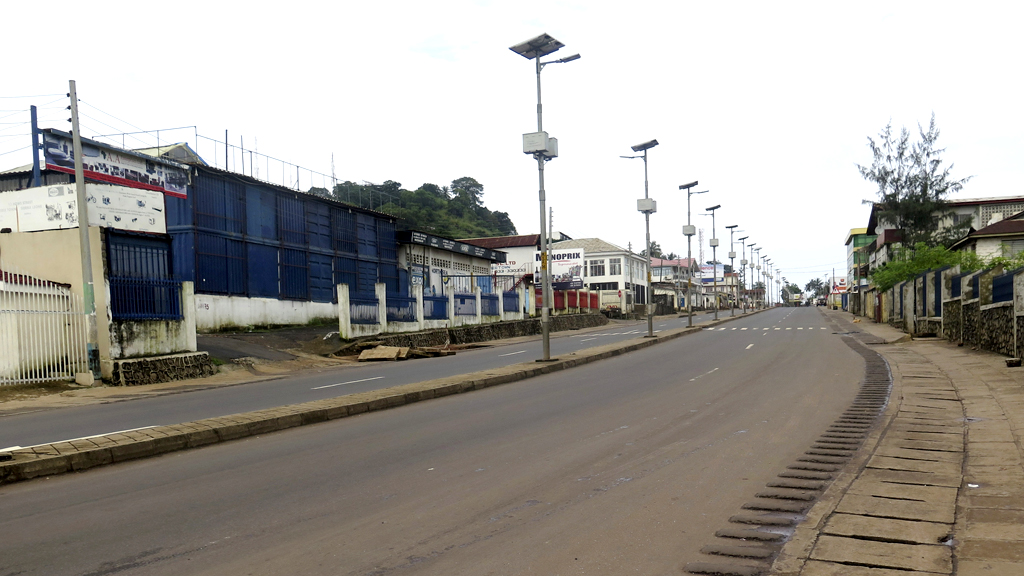Disabled most at risk as Sierra Leone fights Ebola
The Ebola epidemic has exposed Sierra Leone’s inability to combat a health crisis. Days after the country’s nationwide lockdown, it is still the disabled and the elderly who are most vulnerable.

A nationwide lockdown designed to contain Ebola ended at midnight on Sunday, when residents were allowed to leave their homes after a mandatory three-day curfew, writes Paul Myles of On Our Radar. But many rural Sierra Leoneans are increasingly concerned by the threat of hunger and starvation amid worsening food shortages and trading restrictions.
In the capital Freetown last week, ahead of the lockdown, residents were out onto the streets in their masses as they sought to obtain vital provisions before three days without access to local markets and food vendors.
Amjata Bayoh, a medical professional from Freetown, described the scenes at the bustling Congo Market as the “busiest he had ever seen”. Bayoh explained that transportation networks had ground to a halt, with “all motorbikes, taxis and minibuses” engaged, making it difficult for many people to secure provisions.
Similar scenes were witnessed in Bo – Sierra Leone‘s second largest city – where disabled journalist Patrick Lahai failed to secure food provisions amid inflated prices. “It was a bit difficult because prices were so exorbitant in the market… the pressure was so high. I was not fortunate [enough] to get a supply, but I am fine. I have a friend who helped me to have some food at home.”
Attempts were made to ensure that the local homeless had the support necessary while the streets were deserted. “We provided cooked food for the children and for the disabled. They give them raw food materials… we are feeding the street children from area to area.”
Isolation and suffering
But for the northern district of Kailahun, government measures have caused further isolation and suffering. Cut off from the rest of the world, with markets, banks and borders closed for over three months, food prices have risen and military blockades have made it hard for farming communities to continue trading. For some, the prospect of hunger has now become a greater concern than Ebola.
The lack of food has lead to the loss of lives. A 65-year-old farmer, Pa Tengbeh, recently starved to death in his home in Kailahun. His son, Marthus Tengbeh, emphasised the struggle people in remote communities have faced to obtain sufficient food to survive.
The government have not provided us with any food. This led to the death of my father. Marthus Tengbeh
“The late Pa Tengbeh was without food for the past five days because we have been in quarantine and nobody is allowed to move from one place to another,” he said. “We are poor. We get food from our farm work but the government has deployed police all over, but have not provided us with any food. This led to the death of my father.”
Before the lockdown, youths in Kailahun had threatened to revolt if the government did not act swiftly to offset the food shortages in the local community. One of the youths, Victor Hallie, explained: “We are angry and ready to go on a rampage.”
Desperate farmers in Kailahun – unable to afford skyrocketing rice prices – broke their lockdown curfew to harvest cassava for their hungry families, but were sent home by police.
Read more: Hunger is the new danger inside the Ebola zone

No way to get food
John F Sillah chose to respect the lockdown, despite having impaired mobility due to polio. “It’s not easy for me now,” he explained mid-way through the lockdown. “I don’t have any food because I am a disabled person and I don’t have any way to get my food.
“We hope that we can get food through the government, who made a statement that disabled would have food. But where I am we don’t have anything like that. I didn’t eat anything today. I didn’t get anything.”
He said he was not the only one struggling. “In the community where I am, the lockdown was not easy. People could not do business. Some vulnerable people went without food for three days; they live through the help of others, so if people can’t help, how can they live?”
Divine intervention?
On Sunday night, celebrations on the streets of Freetown started before the official end of the lockdown. “In Sierra Leone, we are religious,” explained Abu Bakarr Kargbo. “At six o’clock [on Sunday] people were outside shouting ‘Jesus! Jesus!’… They believe that by using the name of Jesus, they will succeed in kicking Ebola out of Sierra Leone…
“It happened during the war days. People were told if they shout ‘Jesus!’, they will have divine intervention to end the war and this is the same thing that happened yesterday. People came out of their homes shouting “Jesus! Jesus!” Muslims as well as Christians. People have hope that one day Ebola will go.”
As Sierra Leoneans try to go back to business as usual, the Ministry of Health and Sanitation declared that 56 new cases of infections have been confirmed during the lockdown, which they claim had reached 75 per cent of its intended target of 1.5 million households.
It is hoped that the measures taken to educate the population during the lockdown will prove successful in the mid-term, but it remains to be seen how the vulnerable will cope with the ongoing crisis.
This article was compiled from SMS reports sent in by On Our Radar reporters from around Sierra Leone